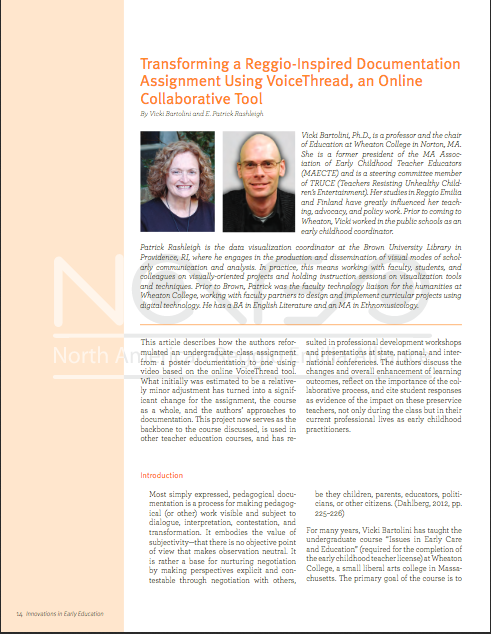A New Method of Learning
Vicki Bartolini, professor of education, co-authored the article “Transforming a Reggio-Inspired Documentation Assignment Using VoiceThread, an Online Collaborative Tool” with E. Patrick Rashleigh, a data visualization expert and former Wheaton faculty technology liaison, for the journal of Innovations in Early Education: The International Reggio Emilia Exchange in March 2017.
The article focuses on the reformulation of an undergraduate class assignment from poster documentation to online video using the VoiceThread tool.
Together, Bartolini and Rashleigh address changes and overall enhancement of learning outcomes, reflect on the importance of collaborative learning processes, and refer to student responses as evidence of the impact on current and future teachers both inside and outside the classroom.
Bartolini writes “We have expanded the community of creators, viewers, and commenters from the classroom to local preschools, to state, national, and international realms. The project, through its iterative and looping processes, forces all involved to review, reflect, discuss, analyze, communicate, and construct new knowledge through multiple modes.”
Bartolini has taught the course “Issues in Early Care and Education” for many years, and her research builds on course goals. A primary goal is to move the class from a micro view of children’s play and learning in early childhood settings to a macro perspective that encompasses policy and workforce issues.
Professor Bartolini’s studies in Reggio Emilia, Italy impressed on her the importance of pedagogical documentation as an important methodological tool in early childhood teacher education. In particular, there is an emphasis on documentation in preschool settings as a way to make a child’s learning “visible.” When learning can be recalled, revisited, reformatted, and reinterpreted in a cyclical format, it can become a basis for decision making.
When putting this into practice, however, there were some challenges. Student participants implementing these changes often felt uncomfortable when asked to field their own driving questions and at not being specifically directed towards answers. Some students also felt lost in complex video production and interaction with the VoiceThread software.
While this proved to be challenging, Bartolini attempted to allay any anxieties by highlighting student work from previous years, giving detailed timelines of the work process, and by providing background readings for understanding pedagogy. Ultimately, it was important for them to trust the iterative process – a fact that remains unnerving at times to students and faculty alike.